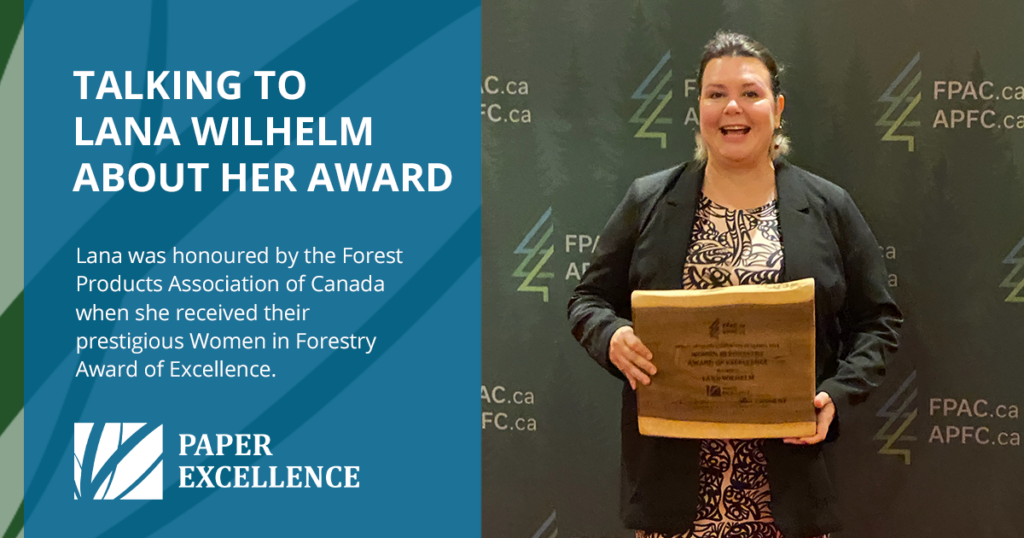
In an industry where women have historically been underrepresented, women like Lana Wilhelm are creating new paths for the next generation of female leaders in forestry. Now the Director of Indigenous Relations for Paper Excellence Canada, Lana has spent nearly three decades contributing to Canada’s forest industry.
Her deep commitment to Indigenous Relations and dedication to environmental stewardship have earned her the prestigious Women in Forestry Award of Excellence from the Forest Products Association of Canada (FPAC).
A Passion for Forestry Rooted in Stewardship
Lana’s love for forestry began in the early days of her career, during her time tree planting in remote regions of western Canada. This hands-on experience sparked a lifelong dedication to environmental sustainability. However, it was her time spent working in soils and ecology research and land use planning on Haida Gwaii, that solidified her passion. It was there that she first encountered the deep cultural values of coastal First Nations, which would go on to shape her career.
Lana reflects on those early days, saying, “Learning from coastal First Nations cultural values on the ground fired me up with this vision of how I wanted to be a part of a forest industry that worked together.” Her journey into Indigenous relations within the forest industry became a personal mission to weave together the worlds of Indigenous knowledge and western science – a vision she has carried forward throughout her career.
Making an Impact in Forestry and Indigenous Relations
Over the last five years, Lana has been a leader in building an entire “soup to nuts” Indigenous Relations program at Paper Excellence Canada. As more women in forestry assume leadership roles, they are driving meaningful change by fostering collaboration between industry and Indigenous communities. Under Lana’s leadership, Paper Excellence comprehensive Indigenous Relations program focuses on long-term partnerships.
Lana believes this work goes beyond mere compliance. “Companies can leverage the deep knowledge and unique skill sets Indigenous people bring to the table in sophisticated partnerships,” she explains. “Recognizing that value and having it lead to long-term sustainable employment and procurement policies that drive change is key to any Indigenous Relations program and that’s valuable to me and to our sector as a whole.” Lana’s story exemplifies how women in forestry are making a significant impact by incorporating diverse perspectives into sustainable forestry practices.
Recognition of Women in Forestry Leadership
Lana’s contributions to the forestry industry have not gone unnoticed. The prestigious Women in Forestry Award of Excellence from FPAC recognizes Lana’s leadership in both Indigenous Relations and sustainable forestry. This prestigious award celebrates the growing influence of women in forestry and their ability to shape the future of the industry.
“The significance of being recognized by your mentors and peers within the forest industry genuinely hits home with me,” says Lana. “To be recognized by this group is powerful and impactful.” Her recognition highlights the importance of women in forestry leadership, not just for Paper Excellence but for the entire industry.
Encouraging Women to Pursue Careers in Forestry
Lana Wilhelm’s career offers a compelling message to women considering a future in forestry leadership. The forestry industry, particularly in Indigenous Relations, provides dynamic opportunities for growth, innovation, and leadership. Lana’s journey – from tree planter to Director of Indigenous Relations – illustrates how diverse and rewarding a career in forestry can be.
“There’s enormous opportunity to challenge the policy of what good forestry is through both a social and environmental lens,” Lana says. “And within the industry, there’s a real capacity and willingness to keep learning and growing.”
Lana believes that women in forestry have the potential to shape the industry by incorporating a broader perspective – one that balances sustainable forestry with social responsibility. Through roles in forest planning, environmental stewardship, and Indigenous Relations, women are uniquely positioned to drive change in forestry leadership. “It’s a career that can really take you in diverse directions and that’s exciting. You’re truly only limited by your imagination in your forestry career.”
